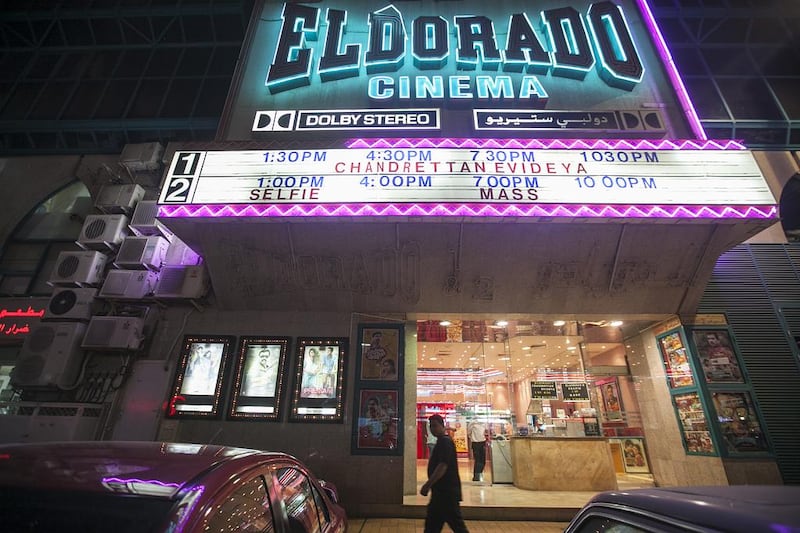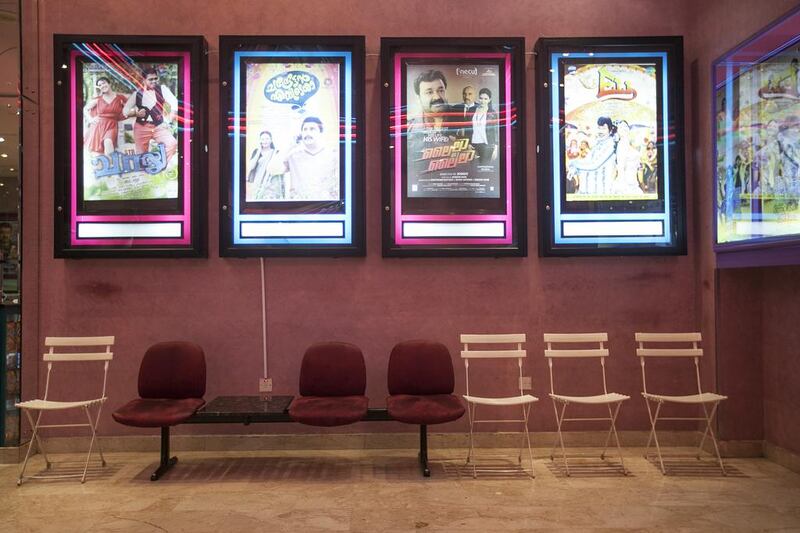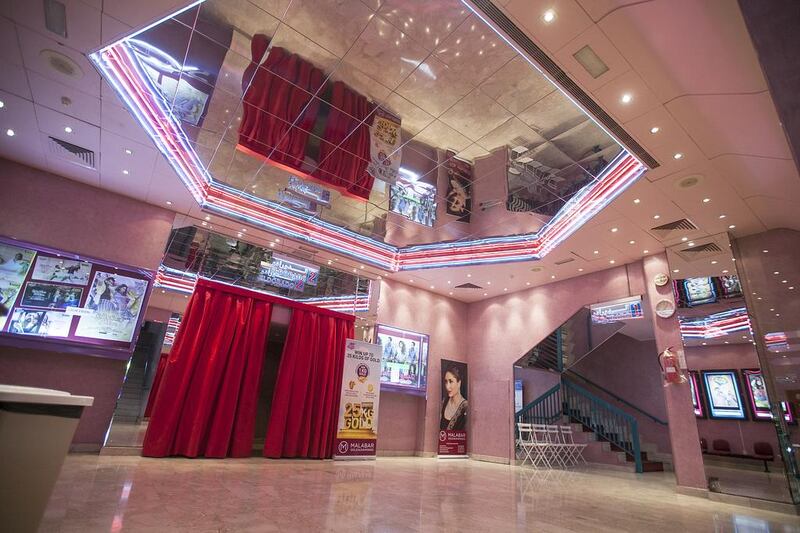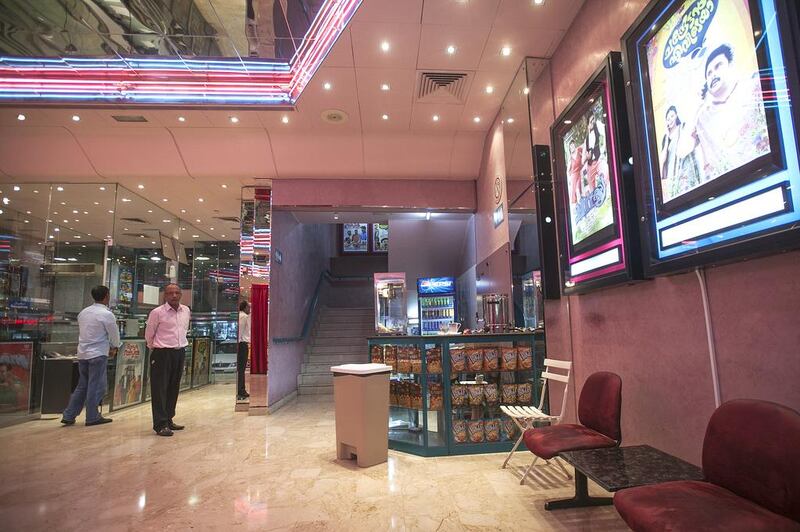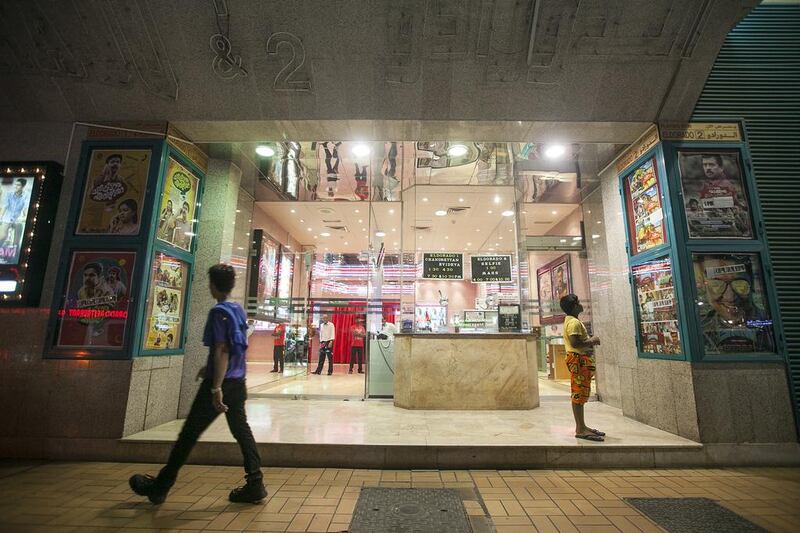It is no lost city of gold, but the Eldorado Cinema, tucked away on Electra Street, is a treasure of a different sort, a remnant of old Abu Dhabi that has survived, so far, in the face of a rapidly changing neighbourhood.
Initially screening a mix of different language films when it opened in 1994, the cinema has, for the past 15 years, concentrated on those filmed in Malayalam and Tamil, official languages of India that are mainly spoken in the south of the country.
More than two decades on, little has changed about the two-screen cinema, which can seat about 450 people at full capacity. The neon pink, turquoise and purple signs stand out among the other shops on the street, while, inside, the same dusty pink wallpaper and red velvet curtains greet patrons.
Sitting in the brightly-lit ticket booth by the entrance, surrounded by framed posters of films, 51-year-old Suresh Kumar says it is this lack of change that continues to draw people in.
“It is familiar,” says Kumar, a native of Kerala who has worked at the cinema for 17 years.
“People come here and enjoy the cinema. We [the staff] also enjoy it with them.
“When people go to hospital, they have sad faces. For the cinema, everyone is happy. With that happiness, they come to the cinema.”
Another part of the Eldorado’s appeal, Kumar says, is its refusal to embrace technology.
“Regular families, they like Eldorado because it is not computerised. Only this one,” he says, pointing to a computer screen at his desk. “But it is not for tickets. We wanted the net connection. There is no website and we have no online bookings.”
Instead of a booking system, staff use a printed seating plan, marking seat numbers on tickets.
Upstairs, in one of the projection rooms, sits Damodaran Koroth. Originally from Kerala, Koroth has worked as a projectionist for more than four decades, working at Eldorado from day one. Despite switching from film to digital projectors throughout his career, Koroth keeps a film projector on his desk as a memento.
Before the shift to Malayalam and Tamil-language films, the cinema showed the latest releases, including Titanic and Saving Private Ryan. One of the last English-language films Kumar remembers being screened there was Scream 2, "the one with the face masks".
For the city’s teenagers in the 1990s, it was the place to be.
“We were literally there every weekend,” says 33-year-old Emirati Mohamed Jawad, with a laugh. “It was the hangout back in the day. There was a fast food-chain restaurant that opened in the same building on the other side so we’d order food and we’d catch every movie there was.”
Although a small cinema by most standards today, at the time, says Jawad, two screens were a lot and it was considered huge. Jawad, a project engineer, is a keen cinemagoer who has collected his ticket stubs for years. And while the Emirati and his friends no longer go to the Eldorado, it allows him to look back on his childhood and teenage years fondly.
“Surprisingly, in the last couple of months, a bunch of friends and I have heard people reminiscing and talking about Eldorado. We’ve also tried to gather a bunch of friends and say, ‘You know what? Let’s go ahead and watch a movie’. We just want to go back to Eldorado. This has been coming up a lot lately. A lot of people have been passing by, saying they would love to experience it one more time.”
Abdul Naser, a night watchman who works in Khalidiya, need not reminisce. The Keralite usually visits the cinema every two weeks, on his own, to watch the latest movies.
Bollywood films, he says, never make the cut. He will always make room, however, for Kollywood (Tamil) and Mollywood (Malayalam) productions.
They are, he says with a smile, the better films.
Shafeek, also from Kerala, who works in IT, says the cinema reminds him of the ones back home. Next week, he and his friends will spend the evening watching Oru Vadakkan Selfie, a Malayalam comedy thriller.
Despite the steady pace of customers, from working-class men to middle-class families, the cinema has come across some stumbling blocks, Kumar says.
Changes to the surrounding area, namely, with regards to parking spots, have had a knock-on effect on ticket sales. Competition also comes in the form of National Cinema, which shows Hindi films, and which sits next door.
When the building was opened, in 1992, there was no underground parking, Kumar says. There was no need for it. However, the lack of spaces is now an issue, and one that has led the cinema to consider other options, including the possibility of moving location.
“Because, you know, we should,” he says.
But the popularity of the Eldorado endures, a defiant symbol of Abu Dhabi cinema before the multiplexes.
“We will stay as long as we can because we also like this place. It is like our house.”
Zaineb Al Hassani is a senior news editor at The National.
zalhassani@thenational.ae
